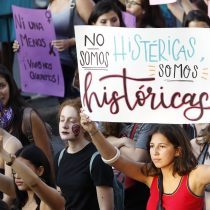
Last year, March 8th was Sunday. From early on you could see a different vibe. As they descended fully closed Providencia Street, many women of all ages swarmed, green handkerchiefs on their necks, crammed with banners, canvases and flags; intermittently you could hear pythons, hype, palms, feminist screams. Arriving in Plaza Dignidad, accompanied by friends, she already understood the day in all its magnitude: millions of women on the street, women on top of Baquedano, intervened with belts, paintings and feminist canvases. Stopping between the great mass located between the Teatro de la Chile and the Pío Nono Bridge – “ground zero” of the social revolt of 18-O – he saw women dancing, laughing, screaming, playing instruments, selling feminist spiments and stickers; lots of green and a lot of lilac; thousands of graffiti, posters and feminist street art settling on all walls; women with guagua cars, women in wheelchairs, Mapuche and Aymara women; secondary women and senior women; lesbian and bisexual women; trans and non-binary people, transvestites; teachers, scientists, private home workers, students, nurses, sex workers and parvulators, so many, but so many, women, everywhere and as far as the eye could be projected.
A year later, those images look like a dream. It was the last pre-pandemic week, of that other life in which we could join friends without mask and without social estating; greet us with hugs and kisses on the cheek. Then I still had a playground during the week and went to my office to work. I remember that days later we went to a friend’s house outside Santiago and relaxed, one last meeting before the strongest part of the semester departed. I was the type to say, “Well, if the Coronavirus is like a strong flu, right?” Now I laugh at myself and my naivety: how would I know?
The week after we started locking ourselves up. First, confusing and complex transit to telework; then a temporary, and then permanent, closure of the playground. On 19 March 2020, Piñera declared “a state of catastrophe”, which limited free transit. So, we went back to the curfews associated with the outburst and of which we have not come out. By the end of March, nothing was clear, but the picture did not look very positive. Increasingly appalling news and blunt instructions: don’t leave your homes! The virtual police station system was imposed and permits requested. The world gets too small. We’re just my 3-year-old daughter and I’m in an apartment every day; I work with her on it, literally. I felt sad, I felt lonely (any chibollent song, but no less real).
By August, after five months of never leaving the house and seeing virtually anyone, I made the radical decision to travel to my sister’s home in California. It was a negotiation with myself: getting Coronavirus on the plane scared me less than following another six months locked up and with Coronacrisis of care.
This second phase of the pandemic has been sweet and oily. Thank you: in July I was involved in a journal protection appeal for a column written by the Feminist History Network. In August I received the good news that the appeal was not progressing but only months later, in December, I was informed that the same person put a criminal complaint against me for insults (by the same column), asking for 541 days in prison and a fine of between 20 and 150 UTM. As far as is known, it is the first post-May Feminist case of 2018 in which an academic is ousting against an academic for insults. On this we have written a letter that receives signatures until March 8 and already has more than a thousand signatures: https://docs.google.com/forms/d/e/1FAIpQLSfYEHarHtXConGgQf_iUr1RHtqRa9yFkmYERptaoaOJEAyLpw/viewform
Despite this massive support, as well as the multiple messages of encouragement that have come to me from all over Chile and the world, this has been a strong blow during an already very complex context. In addition, as we expressed in the letter, it is part of a series of slaps against women who have reported sexual harassment and violence: expulsions and dismissals of students and academics; court decisions that say “touching” is not sexual harassment; politicians who talk about “small humiliations”; protection resources and criminal complaints for insults and slander, and so on. As TheSis said: “Patriarchate is a judge.”
But then there’s the sweet thing: march 8, 2020 and “historic” women in Dignity Square they could not remain in one more commemoration. In her honor – and in honor of all the women who made history and came earlier – we worked on a new book of which I am co-author: Historical: feminist and women’s movements in Chile, 1850-2020 – and which will be published by LOM within next week. The writing of this book, which we began to put together in September, held me in difficult times and I know that more than one fellow author – Ana, Gina, Karelia, Karen, Mary, Panchiba and Ana Galvez, who was also our dear coordinator – was also accompanied and excited by this great project.
For me, moreover, my participation in this book was entirely thanks to the help of my sister and mother with care. As we well know, the pandemic has been a context in which the writing of women researchers has gone down miserably. It was only thanks to my family networks that I managed to break this trend into something.
Although all the authors of the book are part of the Feminist History Network, making feminist history among so many was an apprenticeship and a challenge. It was a collective planning and writing where multiple historians thought, wrote, quoted and edited together. It was not a process free of tensions and conflicts, but the book is a final product that we are all proud of. It is quite unique and very novel; not so long ago you couldn’t even imagine such a feminist history book, with a pull of thousands of copies and the pretence of reaching a wide audience.
In addition, the book rescues little-known stories of women’s and feminist groups in different historical periods and geographical regions, from northern to southern Chile, as well as women not listed in many history texts to this day: settlers and peasants, women from indigenous and Afro-descendant peoples; lesbian and trans women. It highlights women political leaders and their struggles to change the state, as well as those social movements that have removed us from the nineteenth century onwards and the women and sexual dissents that have participated in such spaces.
Within the text, various feminist currents are contrasted, recognizing different contributions to feminisms (plural) in Chile, while exploring the clashes that have existed between these multiple ways of understanding feminism, in theoretical and practical terms. It is an updated book in historiographical and theoretical, as well as particular in his decision to cite mainly women and sexual dissents within his bibliography. Because quoting is also political and must be a feminist. And because we know that many of the same stalkers who persecute us in court are still cited and included in the meshes of History.
We hope that through the Historical pages – written for a general (non-academic) audience, and which includes sections on feminist archives, documentaries and cinema – we can meet once again. There we will see each other commemorating, celebrating, lamenting, raging; but, mainly, remembering, walking through the footsteps of our ancestors and recognizing bits of collective memories shared within these hundred and seventy years of history. Historical we went, we are and we will be.
The content poured into this opinion column is the sole responsibility of its author, and does not necessarily reflect the editorial line or position of El Mostrador.





